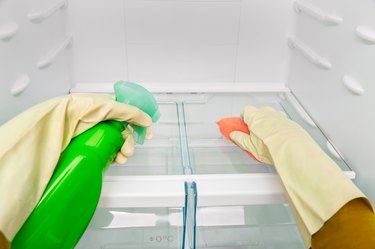
When the spoiled milk smell in your fridge gets so bad that you think twice before grabbing a snack, it's time to confront the problem. Banishing funky odors from your fridge isn't as simple as throwing away the source because smells dissipate slowly in a box with an airtight seal. The only way to get rid of that sour odor is to do a deep clean of every inch of the fridge's interior. Not only will it look and smell a lot better when you're finished but this chore also forces you to finally throw out all those expired condiments you've been ignoring.
Things You'll Need
Cooler of ice
Dish soap or multipurpose cleaning spray
Paper towels
Bleach
Spray bottle
Baking soda
Glass measuring cup (or 1-quart bowl)
Cloth or sponge
Activated charcoal
Video of the Day
How to Clean a Smelly Fridge
Step 1: Start With a Full Clean-Out
Fill a cooler with ice and empty everything that's still edible into it. Your fridge will be out of service for a few hours, so anything that can't sit out at room temperature for that long should be on ice.
Video of the Day
Step 2: Wash Removable Components
Take any removable shelves, drawers or other components out of the fridge. These parts can generally be washed in your dishwasher or you can hand wash them in the sink with dish soap. If you don't have a dishwasher and your sink is too small to accommodate the removed parts, spritz them with multipurpose cleaning spray that's safe for glass and plastic and wipe them down with paper towels.
Step 3: Sanitize Refrigerator Walls and Shelves
Bleaching the walls and nonremovable shelves of the refrigerator kills bacteria, fungi and viruses on these surfaces, which is a good idea whenever you're cleaning the fridge. Obviously, you don't want to let germs flourish in the place where you store your food. Sanitizing with bleach should also help knock down the spoiled milk smell, though it may not remove it completely. (Also, bleach won't clean up any of the food residue that has probably built up inside your fridge over time.)
Use a bleach solution of 1 tablespoon of chlorine bleach per 1 gallon of water to spray or wipe down everything inside the fridge. This sanitizing solution is weaker than you would use to disinfect things like countertops, but it's safe for surfaces that come in contact with food. Prop the fridge doors open until the surfaces have air dried.
Step 4: Clean Surfaces With Baking Soda
Pour a few tablespoons of baking soda into a 1-quart glass measuring cup and add enough water to fill the cup. Dip a clean cloth or sponge into the baking soda mixture and use this to clean the fridge's interior. The baking soda should neutralize the spoiled milk odor, and it is just abrasive enough to loosen dried food without scratching plastic or glass. Follow with a clean, wet cloth or damp paper towels to remove any baking soda residue.
Step 5: Air Out the Fridge
Prop open the doors and let the refrigerator air out for as long as you can stand to be without a fridge. This might be just 30 minutes or as long as overnight. (If it's the latter, move everything from your freezer compartment into a second freezer and unplug the refrigerator while it airs out.)
Step 6: Add Odor Neutralizers
Add activated charcoal sachets to corners of shelves if the fridge still smells like spoiled milk when you're finished cleaning. You can also make your own DIY fridge deodorizers by pouring activated charcoal into small jars with holes punched in them. This kind of charcoal tends to be more effective at absorbing odors than baking soda. You shouldn't ingest a lot of activated charcoal, but it's safe to keep it in your fridge near your food.